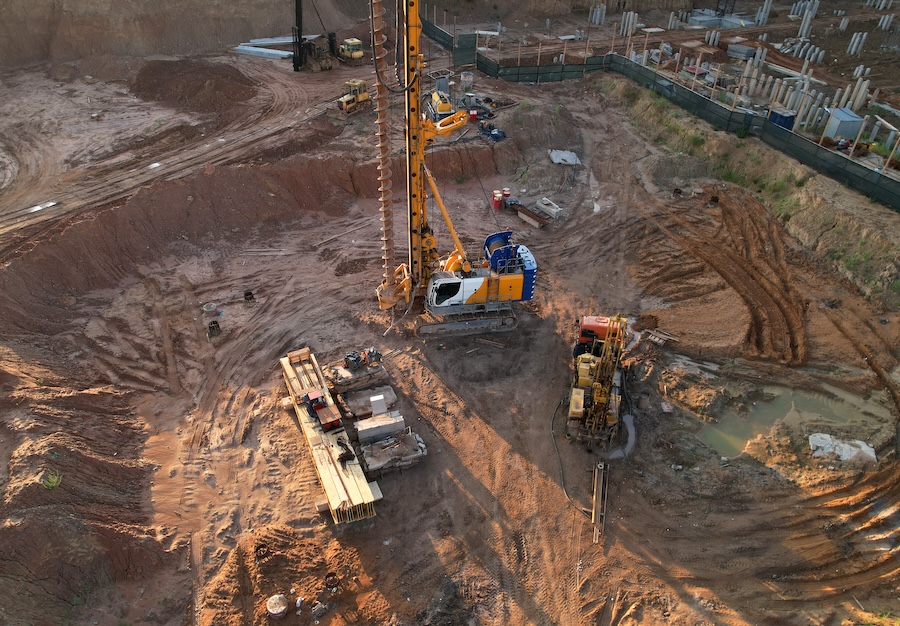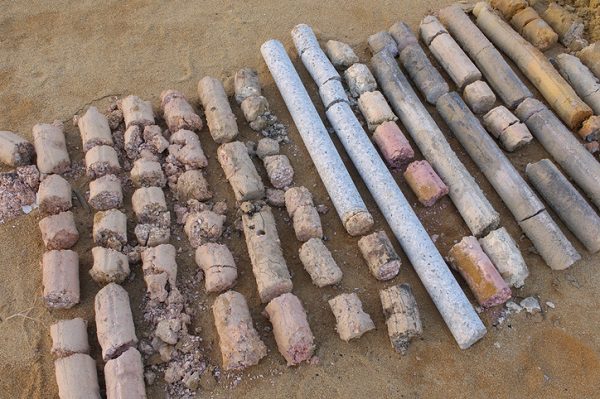Checking out the Function of a Geotechnical Engineer Description and Duties
Checking out the Function of a Geotechnical Engineer Description and Duties
Blog Article
The Importance of Geotechnical Engineering in Attending To Ecological Obstacles and Enhancing Building And Construction Safety
Geotechnical engineering offers as a foundation in the junction of environmental stewardship and building and construction safety and security, giving critical understandings right into the habits of dirt and rock under numerous problems. By carrying out tactical site investigations and customized reduction procedures, geotechnical designers play a crucial function in securing both human lives and eco-friendly integrity.

Duty of Geotechnical Engineering
Geotechnical engineering plays a critical duty in the design and building of infrastructure by dealing with the behavior of soil and rock products under various conditions. This area of engineering is necessary for comprehending the interaction in between frameworks and the ground, that includes identifying the load-bearing capability of dirt, examining security, and forecasting potential settlement or failing.
Geotechnical engineers are accountable for performing website investigations, which entail tasting and testing soil and rock to collect information on their chemical and physical residential or commercial properties. This information is crucial for designing structures, preserving walls, and other earth-retaining frameworks that guarantee safety and durability. Furthermore, geotechnical design educates the selection of appropriate building approaches and materials, thus minimizing risks associated with dirt habits.
Furthermore, the combination of geotechnical engineering principles right into urban planning and environmental monitoring is crucial for dealing with difficulties such as ground contamination and groundwater monitoring. By understanding geotechnical elements, designers can create lasting solutions that enhance the durability of infrastructure versus all-natural threats, while additionally promoting ecological stewardship. Ultimately, the duty of geotechnical engineering is vital for accomplishing risk-free, durable, and ecologically conscious building methods.
Soil Disintegration Reduction
Soil disintegration presents a significant risk to both environmental stability and facilities stability, affecting about 24 billion lots of productive soil shed yearly worldwide. This sensation is aggravated by variables such as logging, urbanization, and bad agricultural practices. Geotechnical design plays a pivotal role in establishing reliable dirt disintegration mitigation methods that protect both the atmosphere and building and construction projects.
One method entails the implementation of erosion control techniques such as vegetation planting, which supports soil with root systems. Furthermore, the building and construction of keeping walls and balconies can effectively reduce surface area overflow and protect at risk locations from disintegration. Proper water drainage layout is additionally critical; it reduces water buildup and routes excess overflow away from vital structures.
Moreover, geotechnical designers use soil stablizing techniques, such as the application of geotextiles and naturally degradable floor coverings, to improve dirt cohesion and protect against deterioration - geotechnical specialist. Routine monitoring and analysis of erosion-prone websites enable timely treatments, making sure lasting sustainability. By incorporating these techniques, geotechnical design not just mitigates the effects of soil erosion but additionally contributes to the resilience of infrastructure versus ecological obstacles, ultimately cultivating a much safer and a lot more lasting developed atmosphere
Groundwater Protection Methods
Groundwater functions as an essential resource for drinking water, farming, and industrial procedures, making its security vital for ecological sustainability and public wellness. Effective groundwater security strategies are critical in minimizing contamination risks and guaranteeing the longevity of this resource.

Normal surveillance of groundwater high quality is additionally essential, enabling very early detection of contamination resources and facilitating timely remediation efforts. Using advanced technologies, such as geophysical surveys and remote sensing, help in recognizing possible hazards to groundwater books.
Additionally, public education and stakeholder involvement are vital, fostering community support for groundwater protection efforts. all about geotechnical engineering. By combining regulatory measures, technological improvements, and area participation, we can produce a comprehensive structure that safeguards groundwater sources while promoting sustainable development and building and construction practices
Landslide Threat Management
Landslides position substantial dangers to both human safety and security and framework, making effective threat management methods vital. Geotechnical design plays a critical role in identifying, assessing, and mitigating landslide risks. A thorough understanding of incline stability, soil technicians, and hydrology is important for creating reliable threat management strategies.
The initial step in landslide risk administration involves complete site examinations, which consist of geological mapping and dirt testing. These examinations help engineers evaluate the potential for landslides by determining critical factors such as slope angles, soil structure, and water material. Making use of sophisticated innovations such as remote picking up and geophysical studies can boost the accuracy of these analyses.
Once dangers are determined, appropriate mitigation steps can be executed. These might consist of design solutions such as maintaining wall surfaces, drainage systems, and slope stabilization strategies. Monitoring systems should be established to identify indicators of ground movement and adjustments in click to read more water levels, enabling for positive interventions.

Enhancing Building And Construction Safety And Security
Building and construction websites frequently provide a myriad of hazards that can threaten employee safety and task integrity. Geotechnical engineering plays a vital function in enhancing building safety and security by providing essential insights into subsurface conditions. Through detailed soil and rock evaluation, geotechnical engineers can identify possible dangers, such as soil instability, groundwater concerns, and seismic vulnerabilities, which may compromise the safety of construction tasks.
Carrying out geotechnical remedies, such as correct foundation layout and the usage of retaining frameworks, alleviates these threats significantly. These options not just guarantee the security of the frameworks being constructed however also develop a safer working environment for building and construction personnel.
Additionally, cultivating a culture of safety and security via training and adherence to developed safety procedures even more enhances construction site safety and security. By integrating geotechnical experience right into the planning and implementation phases, construction tasks can attain higher security requirements, ultimately safeguarding workers and ensuring effective job completion.
Final Thought
In final thought, geotechnical engineering serves as a critical self-control in promoting and dealing with ecological difficulties construction safety and security. Via effective soil erosion reduction, groundwater defense strategies, and landslide threat administration, geotechnical designers add to the advancement of resistant infrastructure.
Geotechnical design offers as a foundation in the intersection of ecological stewardship and construction safety, giving vital understandings into the behavior of dirt and rock under numerous conditions. Geotechnical design notifies the selection of suitable building methods and products, thereby lessening threats linked with soil actions.
Geotechnical engineering plays an essential role in developing effective soil disintegration mitigation approaches that read this article protect both the atmosphere and building and construction jobs.
Additionally, geotechnical engineers employ dirt stablizing strategies, such as the application of geotextiles and eco-friendly floor coverings, to improve soil communication and stop destruction. With detailed dirt and rock analysis, geotechnical engineers can determine potential threats, such as soil instability, groundwater problems, and seismic susceptabilities, which may jeopardize the security of building and construction tasks.
Report this page